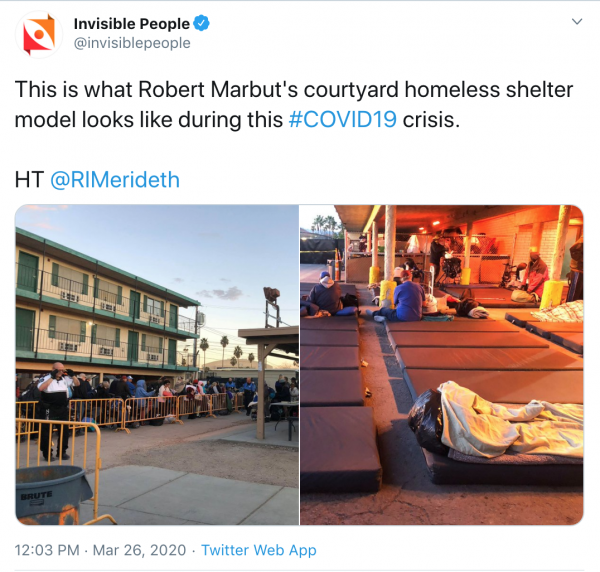People experiencing homelessness in America — already vulnerable and unable to “shelter-at-home” as the pandemic stretches on — are being left increasingly at risk. Unfortunately, the Trump administration’s point person leading the COVID-19 homelessness response is a former consultant whose cruel policies are criticized by housing advocates and Congressional leaders.
Here’s a look at what Robert Marbut has been up to Behind the Scenes:
Robert Marbut is the Executive Director of the U.S. Interagency Council on Homelessness, who has built his career on a punitive “Housing Fourth” approach that closely aligns with the Trump administration’s accelerated plans to criminalize homelessness.
Marbut favors a policing-heavy homelessness strategy that emphasizes provision of food and shelter only as rewards for good behavior, a ban on panhandling, and isolation of services in facilities far from urban centers. Marbut coined his “Housing Fourth” strategy to reduce homelessness to contrast with the evidence-driven Housing First approach that prioritizes housing as a necessary precondition to effectively address other chronic concerns.
Guided by this approach, Marbut founded the Haven for Hope shelter complex in San Antonio, Texas. The hallmark of Marbut’s facility is an uncovered courtyard where residents struggling with substance abuse sleep outside until they pass a required drug test and are allowed to stay indoors. The courtyard garnered a reputation as “a place of despair” after shelter residents suffered hundreds of crimes every year, including assaults and rapes.
As a consultant, Marbut exported the Haven for Hope’s “paternalistic,” “patronizing,” and “dehumanizing” model throughout the country. Over the past decade, Marbut has sought to:
- Establish punitive shelter systems where breaking minor shelter rules — such as rude behavior or failing to clean up — is grounds to exile individuals to sleep in the exposed outdoor courtyards for several days
- Shut down what he deems “urban enablers” of homelessness, like public bathrooms and “renegade” food donations from churches and charities that simply provide food, while pushing homeless services to outside city limits
- Encourage police sweeps of encampments and prevent panhandling, repeatedly making the unsubstantiated claim that “about 93 percent” of cash given to homeless individuals on the street “goes to alcohol, drugs, and prostitution.”
Trump appointed Marbut to lead USICH just a month after ousting his predecessor, Matthew Doherty. Members of Congress swiftly responded, calling Marbut “unqualified, unprepared, and disdainful” of the agency he was tapped to lead.
Marbut’s December 2019 appointment came as the White House looked to strip Housing First language from funding measures, assign new resources to law enforcement personnel to remove homeless encampments, revoke housing funds from cities that choose to tolerate encampments, turn former correctional facilities and federal buildings into large shelters, and use homelessness as a wedge issue to criticize certain local governments (a sentiment Marbut echoed in his first statement as USICH Executive Director).
75 members of Congress immediately expressed dismay that President Trump “would pick someone whose professional work is based on practices that are cruel, punitive, ineffectual, and expensive to run the only federal agency tasked with ending homelessness.” U.S. Senator Sherrod Brown, Ranking Member of the Senate Banking, Housing and Urban Affairs Committee, sought answers regarding Marbut’s appointment. And a group of bipartisan lawmakers urged Marbut to keep the USICH “commitment to evidence-based, non-punitive strategies and practices.”
Now also leading the administration’s COVID-19 homelessness response, Marbut has aided organizations resistant to reducing crowding in shelters and has continued feuding with advocates over Housing First.
The Federal COVID-19 Homelessness Workgroup — a White House task force led by Marbut assigned to coordinate the specific coronavirus response for homelessness — is conspicuously missing longstanding and well-established policy and advocacy organizations, such as the National Alliance to End Homelessness, National Coalition for the Homeless, and National Low Income Housing Coalition, all of which support Housing First policies and have been critical of Marbut’s policy stances and appointment.
Instead, the White House has included faith-based Citygate Network, a close Marbut ally, on the Workgroup. Citygate, like Marbut, opposes Housing First policies, and has helped Marbut champion his work getting “long-seated bureaucrats in an uproar.”
When local governments sought to move people experiencing homelessness out of shelters and into motels and other facilities where COVID-19 would spread less easily, Marbut provided Citygate with a guise to resist relocation efforts by deeming their “rescue missions or ministries” as essential. Homelessness advocates have decried these efforts to prop up crowded shelters during a pandemic as “dangerous,” leaving homeless populations “at high risk of contagion and illness.” Marbut has also been working with Citygate on a proposal to turn “Christian camps and conference centers” into FEMA-funded quarantine centers for the homeless.
We know about Marbut’s cruel and dehumanizing strategies, his feud with those who support the evidence-driven Housing First model, and his latest friendship with organizations to resist sheltering homeless people safely during the pandemic. Here’s what we still want to know:
- Has Marbut continued exporting the non-evidence based Haven for Hope model in his new position?
- How has Marbut been coordinating with HUD to advance the administration’s plans to criminalize homelessness?
- To what extent his fraught relationship with advocacy organizations hindered the USICH’s work?
- And how much access has Marbut given to organizations who are friendly with his policy stance?
On January 6, 2020, we sent Freedom of Information Act requests to both HUD and USICH seeking records related to Marbut’s appointment. We followed this request with another on April 1, 2020 to USICH seeking communications between Marbut and state and local governments.
As both agencies ignored the 20-day statutory deadline to produce records, we filed suit to force disclosure of these crucial records. When we know more, we’ll keep you up to date on our case page.
